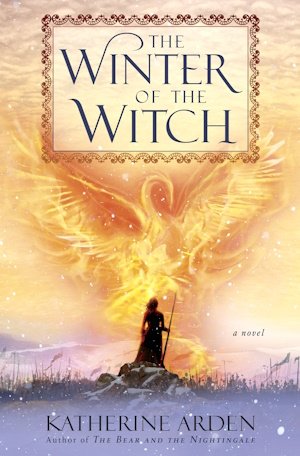In answer, Midnight slid down from her horse, put a light hand on the stallion’s neck, whispered. Voron reared up against the sky, mane flying lightly as feathers, and then a raven flew into the night.
“Solovey never did that,” Vasya said, watching the black horse change and fly.
“Take his other form? He was too young,” said Midnight. “A colt still. The young ones only change with difficulty. He’d have learned to control his own nature if—”
“He’d had time,” Vasya finished flatly. The Bear glanced at her, half-smiling, as though he could taste the hurt.
“We must follow Voron,” said Midnight.
“Get up behind me then,” said Vasya. “Unless—Pozhar, do you mind?”
The mare looked as though she were considering saying no, just to remind them that she could. Very well, she said irritably, switching her tail.
Vasya put an arm down; the chyert seemed to weigh nothing at all.
Riding double on the mare, they surged forward, the Bear at Pozhar’s flank. Ahead, the trees thinned, and a single raven croaked from the darkness.
THE TATARS WERE STILL where she’d left them. Some were still mounted; others stood in a ragged circle. Two reached down, heaving, and Vasya glimpsed the dim shape of her brother being dragged to his feet. He was limp, his head hung down.
“Can you frighten them off?” said Vasya to the Bear, hearing her voice shake, quite beyond her control.
“Perhaps, mistress,” said Medved, and grinned his vast dog-grin at her. “Do keep panicking. It helps me.”
She just stared at him, stone-faced, and he relented. “Do something else useful then. See that tree there? Set it afire.”
A flicker of remembered fire, and the tree burst into flames. It was disturbing, how easy it had become. Being near the Bear fanned the chaos in her own heart. His eye found hers. “It would do you good to go mad,” he murmured. “It would make it easier. You could do any magic you pleased—if you were mad. Storms and lightning and noonday darkness.”
“Be silent!” she said. The fire on the tree grew bigger, sending out a sweep of golden light. Reality wavered; she dug her nails into her palms, and whispered her own name, to make it stop. She forced her voice to calm. “Are you going to frighten them off or not?”
Still smiling, the Bear turned wordless toward the huddle of men and began to creep closer. Their horses backed up, nostrils flared.
Wide-eyed, the men faced the night, swords in their hands.
Within the firelight, a shadow grew. A strange, crawling, mutable shadow, slinking toward men and horses. The shadow of an unseen beast.
The Bear’s soft voice seemed to come from the shadow itself.
“Interfere with my servant?” he whispered. “Lay hands on what is mine? You’ll die for it. You’ll die screaming.”
His voice got into the men’s ears, got into their minds. His shadow crawled nearer, sending twisted shapes dancing across the fire-beaten ground. The men were trembling. A soft, unearthly snarl filled the night. The shadows seemed to spring. At the same moment, a flicker of memory from Vasya made the flames leap in the burning tree.
The men’s nerve broke. They fled, mounted or afoot, until there was only one alone, standing over her brother’s prone form, shouting at the running men. They had let Sasha fall as they escaped.
The single man was Chelubey. Vasya nudged Pozhar then and rode into the light.
Chelubey blanched. His sword-blade dipped. “I warned them,” he said. “Oleg and Mamai—those fools. I warned them.”
Vasya gave him a dazzling smile, without warmth. “You shouldn’t have told them I was a girl. Then they might have believed that I was dangerous.”
Pozhar’s eyes were embers, her mane, smoke and sparks. A touch to her flank drove the mare into a rear. She lashed out with her forefeet, and even Chelubey’s nerve broke then. He fled, leaped to his own horse’s back, shot away. Pozhar, half-maddened, sprang in pursuit. Vasya curbed her after a few bolting strides. Her blood was up; she had to fight her own urge, as well as the mare’s, to ride Chelubey down. It was as though the Bear’s presence goaded them both to rashness.
Well, he could goad all he liked; Vasya would make decisions for herself. “My brother,” she said, seizing control of herself, and Pozhar was persuaded, with difficulty, to turn.
The Bear looked mildly disappointed. Ignoring him, Vasya dropped to the ground at her brother’s side. Sasha was curled up, arms wrapped around his body. Blood showed on his mouth, on his back, black in the firelight. But he was alive. “Sasha,” she said, cradling his head. “Bratishka.”
Slowly, he looked up. “I told you to run,” he croaked.
“I came back.”
“That was disappointingly easy,” said the Bear from behind her.
“What now?”
Sasha tried to sit up, made a small sound of pain. “No,” Vasya said.
“No, don’t be afraid. He helped me.” She was feeling her brother over gently. The blood on his hand and back had gone cold and sticky, and his breath was short with pain, but she could find no fresh wounds.
“Sasha,” she said. “I must go into the camp, and find Vladimir Andreevich. Can you stand? You can’t stay here.”
“I think I can stand,” he said. He tried, struggling. Once he put his weight on his injured hand and made a sound not far from a scream.
But he got himself upright, leaning heavily on her. She staggered under his weight; her brother was barely conscious.

Perhaps that was a blessing, considering how he’d feel about her allies.
“Will you take him up on Voron?” Vasya asked Polunochnitsa.

























